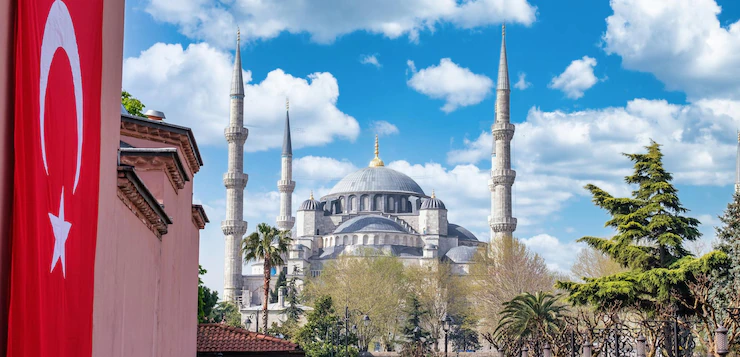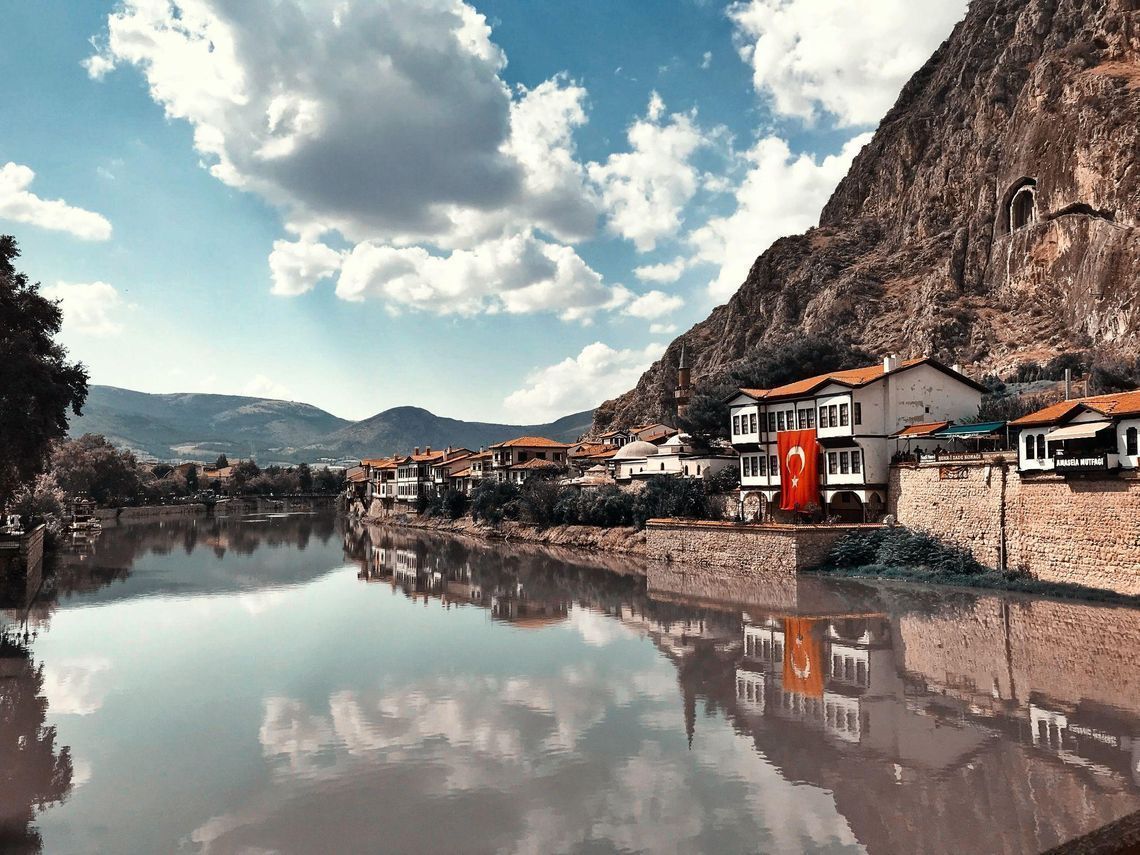Apply to a foreign university with confidence
- Properly fulfilled documents
- Perfect motivation letter
- Support from a personal mentor
- Offers from several universities
Article score: 5 out of 5 (1 review)
Turkish universities meet European quality standards, thanks to the Bologna System, and occupy places in the world rankings of universities.
Free consultation




Universities in Turkey began to appear back in the 15th century, but the government was able to modernize them and create a centralized educational system only after the state gained independence at the beginning of the 20th century. In 2018, Turkey got into the world’s top 50 strongest systems of higher education, occupying 43rd place[1]. Universities of the country comply with European quality standards, thanks to the introduction of the Bologna system, and occupy places in world university rankings.
Items 1-6 of 242
Advanced search
| Program | Age | Duration | Min. cost | Avg. cost | Min. language proficiency | Exams |
|---|---|---|---|---|---|---|
| Foundation | 16+ | 1-2 years | Free | 8,100 USD/month | A1 | Placement exams |
| Bachelor's | 18+ | 4-6 years | 450 USD/year | 7,000 USD/year | B2 | TOEFL IBT 75 |
| MBA | 20+ | 1-2 years | 2,000 USD/year | 15,000 USD/year | C1 | TOEFL IBT 92 |
| Master's | 20+ | 1-3 years | 600 USD/year | 8,000 USD/year | C1 | TOEFL IBT 92 |
| Doctoral | 20+ | 2-4 years | 500 USD/year | 9,000 USD/year | C1 | TOEFL IBT 92 |
To enter Turkish universities, the applicant must provide:
Document and exam requirements depend on the type of program, university, and degree. For example, not all universities require TOEFL, since entrance exams (SAT, etc.) already confirm the language proficiency of the candidate. The application form and documents are submitted through the website of the selected university.
All prices must be clarified on the websites of universities.

Higher education in Turkey was unified in 1982 by a single law that established three types of higher education institutions:
Also in Turkey, there is the University of National Defense and the Police Academy.
There are about 200 higher educational institutions in the country. State universities account for 62% of the total amount. There are 129 of them, including 8 technical universities, İzmir Institute of Technology and Mimar Sinan Fine Arts University[5].
Since Turkey joined the Bologna process, all universities implement bachelor's, master's and doctoral programs.
Higher vocational education after high school lasts two years at Meslek Yüksek Okulları (Higher vocational colleges). Both public universities and private universities have their own vocational colleges. Universities are constantly creating new branches and directions so that education does not lag behind the dynamics of the labor market. Meslek Yüksek Okulları prepares future professionals in various paths, for example, law, design, computer technology, trade, finance, banking and insurance, media, construction, architecture, hotel and restaurant business, marketing, and advertising.
Graduates receive an Ön Lisans Diplomasi or associate's degree. With this document, you can immediately go seek employment or continue your education at the university level by entering the 3rd year of bachelor’s studies.

State universities charge a low tuition fee but are harder to enter. High standards and requirements are set here. A foreign student needs to prepare a package of documents and pass the language and entrance exams. Many international applicants come to the country a year earlier in order to spend this extra year on improving or learning Turkish / English in the Foundation program. This is especially true for those wishing to enter the best universities in the country.
State universities are funded from the government budget. Thus, universities do not manage their own finances, for example, do not determine the salaries of professors. The teaching staff elects 3 candidates for the position of rector, and the President of the Republic makes the final decision.
In demand programs in state universities are in the fields of applied sciences, education, engineering, art, and social sciences. Examples of state universities: Bogazici University, Middle East Technical University, Istanbul University, Istanbul Technical University, Mimar Sinan Fine Arts University and others.
Private universities (Foundation) established by large private foundations. Most of them are created by wealthy Turkish families, and the rest is funded by other countries (mainly the USA). One of the main goals of such financing is the development of higher education in the country. Therefore, it is not surprising that private universities are more likely to be on the ranking lists than state universities. Nevertheless, several public universities compete with private ones for the title of the best higher educational institution in Turkey.
Over the past 15 years, about 75 private universities have been opened in the country[5]. More than half are located in Istanbul, the rest — in Ankara, Izmir and other cities. Universities gather a strong teaching staff, carefully monitor the quality of curricula, and maintain international standards. To do this, they collaborate with foreign universities and offer joint and exchange programs.
Tuition fees are generally higher than in state educational institutions. However, private universities help students pay for tuition: usually, almost 40% of all students receive some financial support[6].
Most private universities have dormitories, small shopping centers, banks, and post offices on campus. The leadership of universities also builds sports facilities: tennis courts, gyms, basketball and football fields, and even swimming pools.
Foundation universities operate freely under the supervision of a board of trustees. The Council appoints deans and rectors independently with CoHE consent. Universities have three different sources of funding:
Some of the private universities in Turkey are included in the world ranking of the best universities QS. For example, Koç University (451st place), Bilkent University (501st place), Sabanci University (521st place).
To enter these universities, an entrance exam is not required, but GPA requirements are quite high, on average — 80%. The language of instruction is English, so universities require a high TOEFL score or one year of a language training program. In addition to top private universities, there are universities with more flexible entry criteria. They conduct studies in English and Turkish, and the required GPA is about 60%.
International Student Services Association (ISSA TURKEY) is the first NGO created to promote Turkish universities abroad. ISSA was founded in Ankara in 2015. Its goals and responsibilities include:
The association includes 10 state and 10 foundation universities.
Turkish Education Association (Türk Eğitim Derneği) was founded on January 1, 1928, in accordance with the vision and leadership of Ataturk. He always believed in the important role of education in the modernization of Turkey. On December 12, 1939, the organization received the status of "Association for the Public Good" and has since been active in the field of education.
The mission of the association includes:
Association founded TED University.
Turkish universities are also members of various international associations:
| Association | Briefly about the association | Number of Turkish universities |
|---|---|---|
| Caucasus University Association | Unites universities in the Caucasus countries, organizes seminars, cultural and educational events, and oversees the Mevlana Exchange Program. | 53 |
| International Association of Universities | Unites universities from more than 130 countries. Acts as the voice of higher education for UNESCO and other international organizations and provides a global forum for heads of institutions and associations. | 18 |
| European University Association | Unites more than 800 universities in 48 European countries. It plays a decisive role in the Bologna process and influences the EU policy in the field of higher education, research, and innovation. | 57 |
| Mediterranean Universities Union | Unites 130 universities from 23 countries on both sides of the Mediterranean. Develops education in the Euro-Mediterranean region. | 4 |
This is not an exhaustive list.

According to the QS ranking 2020, 5 universities in Turkey entered the world’s top 700 best universities: Koç University, Sabancı University, Bilkent University, Middle East Technical University, and Bogazici University. In addition, QS ranked 12 Turkish universities among the top 100 best universities in Developing Europe and Central Asia. These universities were opened only at the end of the 20th century, so over time, their positions will only grow.
Items 1-5 of 5
Advanced searchItems 1-5 of 5
Advanced searchMany universities in Turkey teach exclusively in English. Here programs are much cheaper than in European countries. Most English-speaking universities are either financially supported by American and European research centers, or were originally created as foreign schools.
Items 1-4 of 4
Advanced searchThere are no absolutely free universities, but state universities charge a low fee. For foreigners bachelor’s programs in Turkish cost about 500 USD. Prices at state universities on English-language programs will cost between 600 and 1,500 USD per year on average. The cost of living and expenses for everyday life usually does not exceed 500 USD. The government also offers a scholarship Turkiye Burslari, which covers 100% of the cost of education at all levels of education and provides for a monthly scholarship.

60+ countries
we work with
$1,000,000 saved
by students through scholarships
6,400 offers
our students got